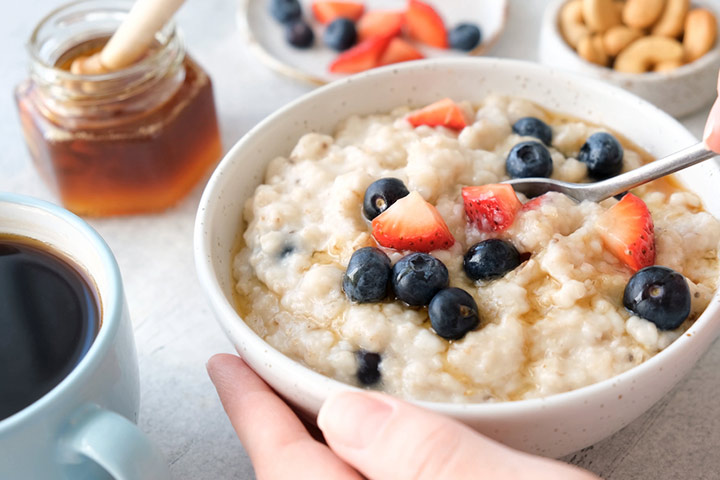Breastfeeding diet! Don’t get nervous. Instead, remember the first rule – Healthy lactation is vital. As your breast milk is packed with all the vital nutrients essential for your baby’s growth and development. A healthy lifestyle and a balanced diet are thus very important for you. With the arrival of the new bundle of joy, ensuring her proper growth and development should be your prime concern as a mother.
Guiding Principle Behind The Breastfeeding Diet
According to the Children’s Hospital of Philadelphia, breast milk facilitates appropriate nutrition and aids a baby’s development in several stages (1). The key principle for a healthy breastfeeding diet is balance. You need to eat a balanced diet, which contains sufficient amounts of all food groups (1) (2).
Grains – Choose whole grain bread and rice as they contain more fiber and nutrients
Fruits and vegetables – Choose bright colored fruits as they offer plenty of antioxidants and vitamins. Eat raw fruits and vegetables, as they are more nutritious.
Proteins – Choose lean meat, fish, eggs, and beans as they provide the right amount of protein you require for the body. Include fish rich in omega-3 such as salmon.
Vitamins and Minerals – Low-fat milk and yogurt are fortified with many essential vitamins and minerals.
What To Eat When Breastfeeding?
Though a new mom is cautioned to eat non-spicy food in order to keep breast milk safe for the baby, there are certain foods that are very helpful for her to heal quickly and maintain good health (1). Given below are some essential foods to include in the diet for breastfeeding mothers (3) (4).
1. Leafy Green Vegetables:
Leafy green vegetables such as spinach and broccoli are storehouses of Vitamin A, Vitamin C, and iron. They are the best diet for breastfeeding mothers, which is important for a baby’s growth. These low-calorie vegetables are also an excellent source of calcium and healthy antioxidants, important for both you and your baby.
2. Seasonal Fruits:
Fruits are rich sources of antioxidants, vitamins and minerals. Vitamin C helps in wound healing and is thus important for new moms who have had a C Section. Hence it is advised to increase the intake of citrus fruits like oranges, berries, and tomatoes in your diet. Fruits like apples and bananas help to increase the energy level in the body and help remain healthy.
3. Eggs:
Eggs are a perfect source of meeting your body’s regular protein requirement. They are also a vital dietary source of Vitamin D. These together help in the development, growth and strengthening of your infant’s bones and muscles and hence are a must in the diet of a new mom.
4. Liquids:
To ensure proper milk production and maintain adequate energy levels in your body you need to stay well hydrated. Dehydration is one of the major issues faced by lactating mothers that can reduce milk production, cause fatigue and drop in stamina. You, as a new mommy, should drink juices, water, soups, and milk sufficiently. However, caffeinated drinks like coffee and tea should be avoided. Additionally, certain caffeine-free herbal teas like fenugreek, fennel, and alfalfa teas can help increase breast milk production while also providing hydration. It is advisable to consult with your doctor prior to consuming any herbal tea while breastfeeding.
5. Whole Grains:
Whole grain cereals such as oatmeal, brown rice, and barley are fortified sources of essential nutrients like proteins, vitamins, iron, and other minerals. They provide energy and stamina to you; help you to relieve postpartum symptoms (if any), while also helping in the overall growth and development of your baby.
6. Low-Fat Dairy Products:
Your diet during breastfeeding must include generous amounts of low fat dairy products like milk, yogurt, etc. Apart from being a rich source of Vitamin B and D, dairy products are one of the best sources of calcium. Calcium is required for your baby’s bone structure development and equally essential for the mother’s wellbeing. If you are a lactose intolerant mother, soy milk is good for you.
7. Lean Meats:
Lean meats from fish and chicken are rich in vital nutrients. They help to provide DHA and essential fatty acids to you and help in developing your baby’s nervous system and boosts overall growth. All the other nutrients present in lean meat promote recovery and general well being of new mommy as well.
Note: As per recommendations from the NHS, you may restrict your intake of oily fish to not more than 280g a week during breastfeeding (5).
8. Garlic:
Garlic has been used for ages by lactating mothers to increase milk production. Adding garlic to your food not only makes it tasty but strengthens your immune system and boosts lactation. Its antimicrobial and antioxidant properties help to battle infection and improve milk supply in your body.
Emily, who is both an adoptive mother and a foster mother to four girls, shares her experience in establishing adoptive breastfeeding with her daughter Lilly, who initially struggled with latching. She says, “I was told eating garlic encourages babies to latch, so I thought why not give it a shot, and so I made some super garlic hummus, ate it for a snack that afternoon, and that night she latched!!! About eight days after I started the protocol, me and my baby girl were getting in the shower. I looked down and realized I had milk!!! It was more of a clear, milky-looking stuff, but I knew this was a great sign that this is working! (i)”
9. Carrots:
Carrots are enriched with carbohydrates and potassium, both of which help boost energy and stamina in lactating mothers. These vegetables also serve as a significant source of beta-carotene, a vital nutrient during lactation, along with sweet potatoes. Antioxidants in carrots also help to shed off the rigid baby weight and thus are a must have in the diet of new moms.
10. Legumes:
The above ten superfoods can be easily incorporated into the breastfeeding mother’s diet. Furthermore, ginger, fennel, turmeric, fenugreek, and raw papaya have been observed to have a positive effect on boosting breast milk production (6). Seek advice from a doctor before incorporating these into your diet.
The above ten superfoods can be easily incorporated into the breastfeeding mother’s diet. It is advisable to eat homemade food that has been prepared with minimal spices and additives so that the baby does not get fed indirectly with too much spice or complex food (via breast milk).
How To Get Your Daily Nutrient Requirements?
You should follow a routine and remember to eat healthy food. Most importantly, have a well-balanced diet. Eat right and don’t simply indulge in your cravings (1).
- Take proteins (poultry, meat, eggs, fish, dairy, nuts, beans, and seeds) 2–3 times a day.
- Include 3 servings of dark green and yellow veggies every day
- Include 2 servings of fruit every day
- Eat whole grains like wheat breads, cereal, oatmeal, quinoa and pasta in your everyday diet
- Drink enough water to quench your thirst since many breastfeeding moms frequently feel thirsty.
- If you are a vegetarian, make sure you take zinc-rich foods like dried fruits (dates, apricots, prunes, and figs), dried beans, dairy, seeds, and nuts ( almonds and walnuts). Iron is a vital nutrient, and you should consider including iron in your diet. Eat leafy vegetables for iron. You may need to take vitamin B12 supplements to provide sufficient levels of B12 to your baby.
How Much To Eat?
You require extra calories when breastfeeding. The baby weight you carry from pregnancy will be used for the milk. CDC states that an additional 300 to 400 kcal is required for a nursing mother per day when breastfeeding (7). However, once your baby starts on solid foods from 6 months, you will be producing less milk, and then you can reduce your calorie intake (1).
How To Get Back To Your Usual Weight?
Breastfeeding burns a lot of energy, but still, it takes many months to get back to your normal weight. But some diet tips can help you lose weight. We list some here (2) :
- Steam, grill, bake, or casserole lean meat, poultry, and fish
- Eat five servings of vegetables a day
- Eat two servings of fruits a day
- Use low-fat dairy products
- Use margarine and butter sparingly
- Exercise for at least half an hour every day
What To Avoid:
- High fat foods like rich desserts, chips and greasy takeaways
- Sugary foods like packaged fruit juices, soft drinks, cakes, and sweet biscuits
What Not To Eat
As a lactating mom, you should know about foods that may not be suitable when breastfeeding. These foods may have a negative impact on your baby. But the good news is that if you maintained a healthy diet during pregnancy, then there is no need to change your diet when breastfeeding. Also, if you see your baby exhibiting any symptoms, you can just avoid the food.
Here are some common foods that may cause negative symptoms in babies (6):
- Spices like chili peppers
- Citrus fruits
- Caffeine can disrupt the baby’s sleep, moderation is the way ahead.
A balanced diet while breastfeeding is of utmost importance to ensure that the baby receives all the nutrients from the milk. Including green leafy vegetables and dry fruits in your diet helps provide the required vitamins and nutrients. However, it is advised to avoid high-fat foods, spicy food, or alcohol during lactation to prevent any unwanted effects on your baby. You must consume a nutritious, balanced diet and follow a healthy lifestyle while breastfeeding to provide the best nourishment to your breastfeeding baby while maintaining your health.
Key Pointers
- Breast milk is rich in nutrients, so a balanced breastfeeding diet is necessary for the baby’s growth and development.
- A healthy breastfeeding diet for mothers should include a variety of foods in balance.
- The diet should include leafy green vegetables, seasonal fruits, eggs, liquids, whole grains, low-fat dairy products, and lean meats.
- Breastfeeding mothers should stay hydrated and avoid caffeinated beverages.














